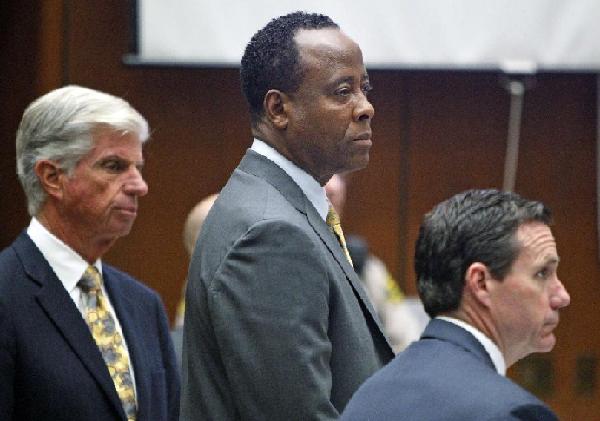Pharmacist testifies against Michael Jackson's physician
 0 Comment(s)
0 Comment(s) Print
Print E-mail
Xinhua, October 5, 2011
E-mail
Xinhua, October 5, 2011
A Las Vegas pharmacist testified on Tuesday as the involuntary manslaughter trial about late pop icon Michael Jackson's personal physician Conrad Murray entered the sixth day of proceedings, telling the court that the cardiologist had purchased increasing amounts of the anesthetic Propofol from him in the leadup to the singer's death.
|
|
|
Dr. Conrad Murray (L) looks on during Murray's trial in the death of pop star Michael Jackson in Los Angeles September 28, 2011. [Photo: Xinhua/Reuters] |
Tim Lopez, former operator of Applied Pharmacy Services in Las Vegas, told the court that Murray had ordered 255 vials of the powerful anesthetic that played a vital role in the pop superstar's death, between April and June 2009. Murray did not specify who the Propofol was intended to be used for, and he never identified himself as Jackson's physician, Lopez said.
Murray first contacted the pharmacist in November 2008 to ask about inquiring the skin-whitening cream benoquin, to treat his patients' vitiligo. Murray told him that he had many black patients who suffered from the skin condition. Lopez eventually located the source materials in March 2009, and Murray placed an order.
Murray's initial order for 10 100-milliliter vials and 25 20-milliliter vials of Propofol on April 6, 2009, was his smallest request, with the amounts increasing to 65 vials in orders on April 28 and May 12 and the largest order of 90 vials on June 10, Lopez told the seven men, five-women jury at the Los Angeles Superior Court.
According to Lopez, after the first shipment had been shipped to his Las Vegas office, Murray removed several bottles of Propofol and asked him, through a courier, to redirect most of the vials to his Santa Monica, Calif. office where the subsequent shipments were also sent by the pharmacy.
Lopez testified that he offered to deliver one of the orders to Murray's Santa Monica office personally in order to save him the shipping charge, as he was traveling to Los Angeles International Airport, but Murray told him there was "no need to do that" and to just ship it.
In earlier testimony, a Houston cocktail waitress who was linked to Murray testified she received a phone call from the cardiologist at 11:51 a.m. during the day Jackson was found breathless.
"I asked Dr. Murray how he was doing. He said, 'Well,' and he paused," Sade Anding said. "I started telling him about my day. That's when I realized he was no longer on the phone."
Anding said she pressed the phone to her ear and could hear sounds that made her think Murray's cell phone might be in his pocket. It was about five or six minutes into the conversation when she realized Murray was no longer on the line. She eventually hung up the phone and tried unsuccessfully to call Murray back twice, Anding told the panelists.
Stacey Ruggles, Murray's personal assistant 1997, began the Day six of trial when she testified that she spoke to her employer for about 8 1/2 minutes, starting at 10:34 a.m., the day Jackson died and spoke to him briefly again at 11:07 a.m. to let him know she had sent an email.
Nicole Alvarez, Murray's live-in girlfriend and the mother of Murray's seventh child, told the court that some packages were sent via FedEx to Murray at the Santa Monica apartment she shared with him, but said she had no idea what the packages contained.
Prosecutors seek to prove Murray, 58, failed to properly monitor Jackson after giving him a lethal dose of Propofol. They contend that the cardiologist "repeatedly acted with gross negligence, repeatedly denied care, appropriate care to his patient, Michael Jackson, and that it was Dr. Murray's repeated incompetence and unskilled acts that led to Mr. Jackson's death on June 25, 2009."
Defense attorneys argued Murray was weaning Jackson off the medication, but that the singer "self-administered" a lethal dose.
The trial is expected to last four to five weeks. Murray, who is set free on a bail of 75,000 U.S. dollars, faces up to four years in prison if convicted of felony charge.






